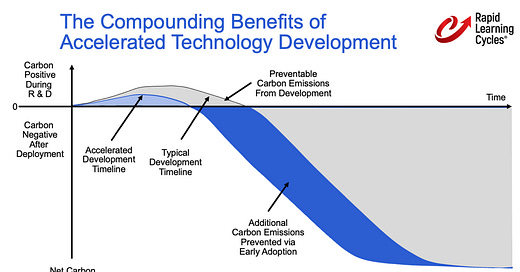Our Approach to Climate Tech Acceleration
We can accelerate the technologies we need to address climate change.
Thank you for being one of our first subscribers! I wanted to make sure you saw this, which is always accessible from our home page and one of the first things we would like new subscribers to read! It outlines our general approach to the problem of how to accelerate the technologies we need to address climate change.
Please feel free to forward this to your colleagues! - Katherine Radeka
I know this is true because I've worked in hard R&D for a long time — physical products that have to go from idea to full-scale production. I've seen how we can accelerate physical products with Agile principles — but not necessarily the practices of Agile software development.
When we do that, we can prevent the problems that lead to delivering the wrong product, at the wrong time and/or the wrong price. We can get products to market at least 30% faster without adding resources. That saves development costs, increases ROI — and accelerates the time to impact.
The things most teams do to accelerate actually slows them down.
When a team is in a hurry because they have limited funds, a fantastic opportunity they don't want to miss, or a great idea they don't want copied, they tend to make the same mistakes.
They cut corners on early experiments to learn before making commitments, they rely too much on rapidly iterating 3D printed parts without thinking about manufacturability, and they commit too early to decisions that have to be revisited later when the team knows more.
They end up carrying a lot of unnecessary risk, because they've made decisions without the knowledge needed to make good decisions that stick. They get bogged down in rework in the most expensive part of hardware development: building the production process and supply chain.
When you know how to avoid these problems, you have a major competitive advantage that will help you go faster than your peers who are still stuck in build-test-fix loops while they burn through their capital.
I believe that an accelerated approach is even more important for climate tech.
Our tax dollars and purchasing power are going to be used, more and more, to support climate tech innovation. Already, the Inflation Reduction Act in the U.S. is spending billions to support renewable energy and electrification. That's only a down payment.
We can't afford to waste another dollar, another minute, or another gram of CO2 we have left in our carbon budget on failed solutions. We need to leverage everything we know about how to get hard tech through commercialization faster.
Climate tech is hard tech.
We do have places where we need better digital solutions but they can only help us optimize the alternatives that exist in the physical world. Some key points:
Renewable energy requires physical infrastructure, from generation through storage to transmission.
Electrification is pulling new physical products in nearly every sector powered by fossil fuels today: heating, cooking, transportation, power tools, and industrial equipment will all need to be replaced with new versions powered by electricity.
The need to decarbonize will eventually affect almost everything from the food we eat and the clothes we wear, to all other consumer and commercial goods. It will drive changes throughout the supply chain from how we gather and process raw materials to how we deliver products to their end users.
We only have commercially-viable solutions for some of this.
I believe we don't have the technology we need.
A lot of climate change champions insist that we already have everything we need — we just lack the will to implement the solutions that already exist. If that were true, we'd already be there.
We are there in a few places. Solar is now the cheapest form of power, and that's reflected in the exponential increases in the installed base of renewable energy. Heat pumps are more expensive than gas furnaces, but rapidly becoming cost-competitive. Induction stoves have dropped in price to be competitive with high end gas ranges.
We still don't know how to:
Produce concrete — the most commonly used human-made material on the planet — without carbon emissions at commercial scale.
Move goods over long distances without burning fossil fuels. We have pilot projects with electric and hydrogen trucks, but they're so early stage that they're not yet moving the needle on carbon emissions in their sector.
Solve the intermittency problem with renewables. Today, some renewable energy generators get turned off during the day, because there's no place for the power to go, and then fossil fuels get burned during peak periods at night.
These are just three of the challenges we need to face.
I'm looking for people who are not afraid of these challenges — who see them as opportunities.
In this Substack newsletter, I'll share what I know about how we can address these challenges, from my experiences helping teams deliver hundreds of products to the market faster.
I hope you join us.




